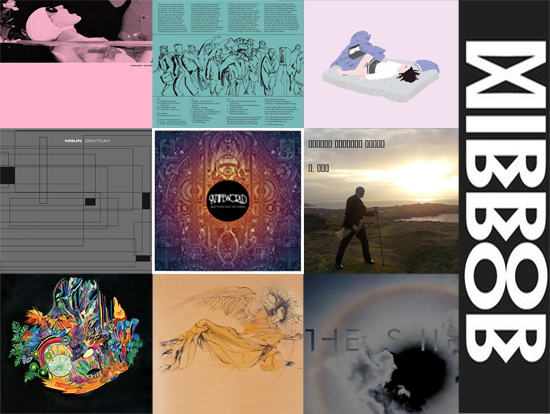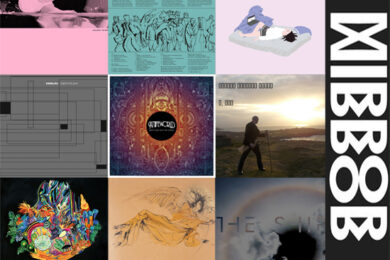Music. There’s loads of it, isn’t there? The sheer volume of it that turns up at our office and in our various inboxes week-on-week means that sometimes even the music we’ve most taken a shine to doesn’t make it to the pages of The Quietus.
With that in mind, we’ll be setting out our individual stalls once a month — at the end of each month — running the full genre gamut in celebration of the music that, for reasons of format, timing, or sheer impracticality, has managed to slide under the radar. Which, in a way, is what we’ve always done.
Blood Sport – Axe Laid To The Root EP
(Blast First Petite)
Sheffield trio Blood Sport are not so much an industrial dance group as an industrious dance group. Live it’s very much a case of heads down over instruments, blinkers on, everything and everyone else blocked out to achieve 100% concentration on the process; quite like former Blast First Petite stars Factory Floor in their 2010 incarnation. The minimalist rhythms play out like My Disco were bolstered with a sampler and drum machine. The dual guitars have a tangential relationship to Niger, Kenya and Nigeria but this is no sun dappled palm wine, no joyous highlife, no rich desert rock, but itchy snaking lines coiling together, then uncoiling, then coiling together again, in a state of permanent discomfit. Their influences are very pre and post punk, sounding specifically like This Heat with the intensity of early Cabaret Voltaire. One would hope that this EP is only an opening salvo, that Blood Sport will continue to grow and evolve from this point, but it is a fine opening salvo nonetheless. One would also state with some confidence that this is what Foals would like to achieve but never have done and never will. One would also like to invite people complaining that this EP came out a few months ago to jog on and bother someone else about it. (John Doran)
Kaitlyn Aurelia Smith – EARS
(Western Vinyl)
In the gently surreal short film Brasilia, the viewer is given a ‘guide’ to the Brazilian capital, introducing the city’s Teleportation Kiosks and Climb Portal among other such civic wonders. It’s probably fitting that the American composer and sound designer Kaitlyn Aurelia Smith should provide the score, given that her aerial arpeggios and retrofuturist electronic burblings make the Templo da Boa Vontade’s posturing as the Telepathy College seem that bit more feasible. That same fantastical element is present on EARS, her third album. The tracks, intermingling synth, treated woodwind and Smith’s processed vocals, feel evocative of landscapes, albeit seen as if through subtly warped vision, and talking about her music, Smith says: “I’ve grown up in the natural world and live in nature now, so I feel inspired by that and want to create sound for it.” With EARS, she more than makes good on this aim and occupies similar territory to Robert Aiki Aubrey Lowe and Ariel Kalma on We Know Each Other Somehow last year, harmonising electronics and ecology. (Laurie Tuffrey)
Mat Riviere — Terrible Trouble
(Super Smash Hit Records)
There are certain words in music writing that rear their heads with near-abhorrent frequency and, in doing so, have lost (or perhaps completely betrayed their initial lack of) all meaning. It’s with some reluctance, then, that I find myself wanting to describe Mat Riviere’s Terrible Trouble as "haunting". This isn’t because the five tracks that make up the EP are uniquely morbid — or, even worse, "ethereal" — but because they conjure a very particular feeling: a sense of loss and familiarity that run parallel rather than in opposition to one another; an undeniable sorrowfulness about the past and present moment, punctuated by a feeling of abstract, distant optimism about those exact same things.
If you’re at all familiar with Riviere’s output up to this point (his brilliant not even doom music, or last year’s covers) then – stylistically, at least — Terrible Trouble isn’t likely to force any kind of immediate double take. But that’s also part of what makes this such an outstanding set of songs: all of the standard tools of Riviere’s trade — samples, sparing percussion, electronics and reaching, quasi-apologetic vocals — are here, but the lingering sensation that they leave behind can’t be so easily pinned down to any one instrument, vocal melody, or chord progression. In a sense, listening to Terrible Trouble feels like reading someone’s diary — except that someone is you, and everyone you know, have known, or will know, dislocated, at one remove. (Karl Smith)
Daniel Patrick Quinn — I, Sun
Since his return from self-imposed, non-music-making exile in Indonesia, Daniel Patrick Quinn has knuckled down in the Outer Hebridies to make an increasingly fascinating series of records, both under the One More Grain banner and as a solo artist. I, Sun is the first funded by one of his eccentric Kickstarter campaigns (no frills offered, but a decent wedge gets you a couple of nights in his isolated cottage next to the runway of Stornaway airport), and continues the visionary, displaced psychedelia of excellent 2014 effort Acting The Rubber Pig. As Quinn explained in a recent Quietus interview, this is a low-key, lo-fi setup using few instruments save old recorders and wine glasses for percussion. The cover art, featuring Quinn striding forth in a £1 eBay grass skirt across a landscape lit by Hebridean sunset, sets the scene for a record that has a profound sense of otherworldy independence. Quinn half sings, half murmurs in defiance over a lightly clattering rhythm and high-pitched whistle in ‘I Followed My Imagination’, "I’d rather live in a cave than go and work at Waitrose". Vocals are layered, the lyrics a conversation that verges on the surreally humorous fringes of sobriety – "I’m going for a drink with Bishop Baaaarkly". A thoughtful, reflective, bucolic, transportive record, I, Sun once again marks out Quinn as an under-regarded, true outsider. It’s about time a label came along and put this man’s work in the traditional manner. (Luke Turner)
MGUN — Gentium
(Kudos)
MGUN’s debut album also marks the debut long-player from Semtek’s long-running Don’t Be Afraid label which has been quietly working away carving out a strong discography from a recurring roster of producers since 2010. More than 20 releases in, having taken in material from producers such as Mr Beatnick, DJ Bone (under his Differ-Ent alias), Photonz, MGUN himself and many more, the label has continued to push forward on the more experimental side of the dancefloor with noteworthy releases coming in the form of last year’s both militant and somewhat heartening M.O.M. 12” from Differ-Ent and the pulsating darkness of 2013’s Metal Irene by Farah.
MGUN’s Gentium is as exploratory as anything else that has come before on the label, its eight tracks moving across a range of tempos, taking in music suited to club warm-ups (‘Pok’) and airy, peak time sets (‘Half Past 3’), as well as darker, more abstract pieces such as ‘Nobs’, made up of menacing synth experimentations and an almost half-step drum pattern – it’s an understated closer but fitting for an album that doesn’t particularly rely on trickery or aim to show-off as such. ‘Don’t Hurt Yo Self’ is sludgy and lo-fi (in the best way possible) making use of a limited sound palette (again in the best way possible), a faint earworm of a melody burrowing its way in during the track’s very final stages.
At times, Gentium is crunchy and abrasive while, at others, it’s faint and comforting, as Manuel Gonzales’ authorial eye ensures proceedings remain coherent overall – an album with the club not too far from the mind which also refuses to be limited by the usual constraints that can befall records of similar constructs. (Christian Eede)
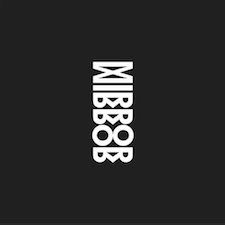
"This apparently punkish slam out, is their finest to date. For it seems to capture the very essence of Islington Mill which, coincidently, is situated in the darkest corner of Salford."
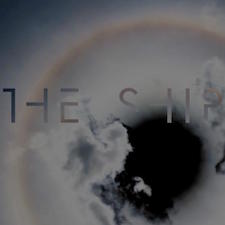
"The Ship is the work of someone who fully believes in the power of art as an empathic tool, as a means to invoke a particular viewpoint, an unconsidered perspective."
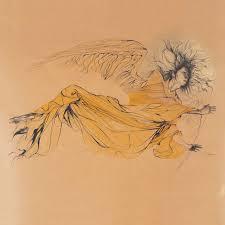
"This is the most powerful ode to our bond with the natural world by a Scandinavian pop singer since Biophilia."
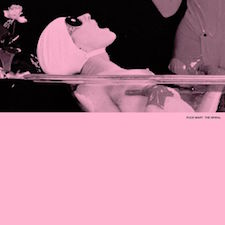
"With The Spiral, Frederikke Hoffmeier has built on rich promise to take her rightful place at the forefront of modern, forward-thinking noise music."
Knifeworld — Bottled Out Of Eden
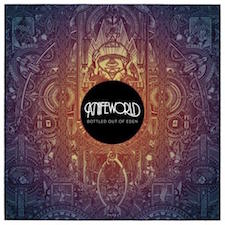
"Knifeworld have their own sonic template, for all the influences mentioned, and emit an effective blend of euphoria and discomfort."

